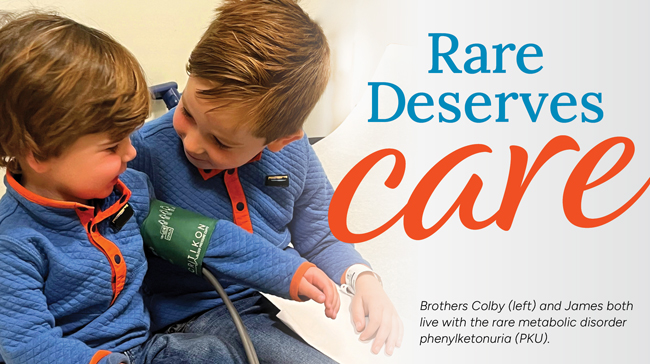Yesterday, a NORD Member Organization and IAMRARE™ Registry Client, The DHPS Foundation, officially launched their patient registry, DHPS Patient Registry. NORD’s IAMRARE Registry Program was built to address the special needs of those developing treatments for rare diseases with extensive input from FDA, NIH, patients, organizations and experts in the field. We are pleased to share the press release that was issued yesterday by the Foundation to announce the launch of their registry.
New York, NY, April 25, 2019—The DHPS Foundation and the National Organization for Rare Disorders today launched the largest-ever study to research DHPS that causes Epilepsy/Seizure Disorder, Neurodevelopmental and Cognitive Delays, Speech and Language Delays, Neuromuscular Delays, and Congenital Hip Dislocation. DHPS currently has no cure.
The new study, the DHPS Patient Registry, creates a platform for patients around the world to share information about DHPS. Its purpose is to build an international resource to be used by scientists in future research.
“While we’re learning more with every new family, there is still a lot left to learn. If you are a parent or family member of someone with DHPS gene mutations, or if you are a clinician or researcher working with a patient with this condition, we would love to learn from you. We believe that families, clinicians, and researchers, all working together and sharing our experiences, will benefit everyone.
We are working to understand through studies what the gene change does to the developing brain and how it affects behavior and brain function. Ultimately, we will test potential treatments in cellular and animal models of the condition and hopefully someday treat people with this condition,” said DHPS Foundation President and Founder, Colleen Olson.
“Our goal is to enroll as many patients, or their parents or legal guardians, as possible,” said Olson. “The success of the registry is dependent upon community participation.”
The DHPS Patient Registry is a natural history study that consists of electronic surveys to collect information about the patient experience and disease progression. Patients, or their caregivers or guardians, can enter information from anywhere in the world. The data is made anonymous and stored securely in an online portal called a registry. The DHPS Foundation may share the data with individuals or institutions conducting research or clinical trials, as approved by the study’s governing board that includes scientists, doctors and patient advocates.
The DHPS Foundation is launching the study in collaboration with the National Organization for Rare Disorders (NORD), an independent charity that built its natural history study platform as part of its mission to help identify and treat all 7,000 rare diseases. The DHPS Foundation is a member of NORD and the organizations work together to eliminate the challenges that rare disease patients face.
“Patient-powered registries are changing the landscape of rare disease research,” said Vanessa Boulanger, NORD’s Director of Research Programs. “By building strong partnerships within the community and with leading scientific experts, NORD’s Registry Program is well-positioned to address knowledge gaps and accelerate the development of discoveries that save lives. We are so pleased to welcome the DHPS Foundation as a partner in our IAMRARETM Registry Community!”
DHPS is an extremely rare genetic disorder that occurs in very few known patients to date. DHPS is a genetic condition that occurs when a change or mutation in DNA is inherited from both parents in an autosomal recessive manner, which means that both copies of the DHPS gene in each cell have a mutation. The parents of an individual with an autosomal recessive condition each carry one copy of a mutated gene, but do not show signs and symptoms of the condition.
For more information, visit DHPSregistry.iamrare.org.
About The DHPS Foundation
Our mission is to help identify and assist individuals with rare genetic disorders, and to work with interested researchers to develop treatment options and cures for those disorders. Our initial focus is on increasing awareness and understanding of patients with DHPS deficiencies and evaluating potential treatments to address those deficiencies.



